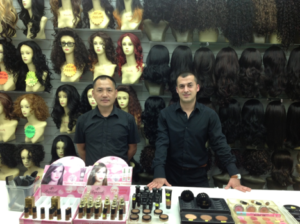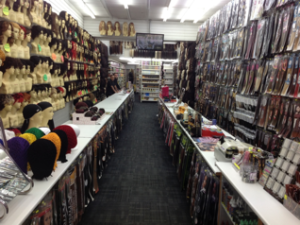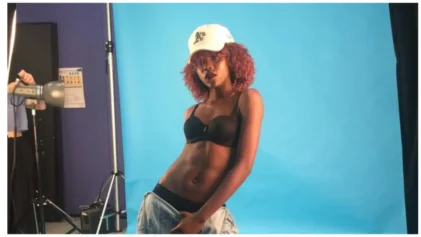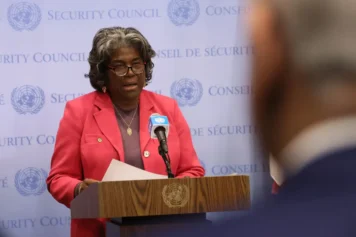
Lalit Angdembe and his employee, Eduard Drobata pose in Angdembe’s hair store in Brixton, London. Photograph: Jacqueline Bediako
Afro hair and beauty is part of a million-dollar industry — Korean-Americans have capitalized on selling products to meet Black women’s hair and beauty needs. In the United Kingdom, a different immigrant population has honed in on the industry. But does this industry rely on Black women’s self-hate?
Thirty-year-old Mohammed Marouf, a British-Pakistani Muslim works in his uncle’s store in London. Marouf believes Black women purchase beauty products because “They want to look good.” An anonymous employee at Marouf’s store had no issue telling me — a Black woman with natural hair — that “Black women were once like men,” but now with their increased use of hair and beauty products “they look better.” In close to a whisper, he stated that, “Black women look better than white women.”
His words were cognizant of the current climate in which Black beauty is shunned, although many are trying to change this. History tells us that Black women were secretly sexually desired, but publicly rejected. Historically, white men have tried to hide their preference for Black women — the third president of the United States, Thomas Jefferson had a relationship and fathered children with Sally Hemings, one of his slaves.
Stores selling Afro hair and beauty products capitalize on Black women’s insecurities and encourage conformity to white beauty ideals. However, others argue that too much emphasis is placed on Black women’s hair, and how they choose to wear their hair should be up to them.
In an article published by the BBC, South African columnist Danielle Bowler states that:
“Whether I weave it, relax it or braid it, I’d like to live in a world where the choice of how to express myself — in hair and everything in between — is mine.”
Similarly, Kuli Roberts, also a columnist, disputes claims that wearing a weave is a reflection of insecurity:
“The idea that when a black person wears a weave it’s a sign of how insecure she is, is just ridiculous frankly. I have options. I treat my hair the same way I treat my nails, I can wear it in many different ways — that doesn’t change who I am.”
Alternative arguments stress that the rejection of Black hair has its roots in white supremacy. White supremacy — which purports that white is superior to black — invades layers of the mind and plants false beliefs about the value of being white. In this state, fair skin, straight hair and other “white” features symbolize beauty, power and sexual attraction. “Whiteness” is construed as noble and “Blackness” is rejected.
The rejection of Blackness paves the way for self-talk lined with hatred. It is this self-hatred — operating under the pretense of self-preservation — that influences “beautifying” behaviors. And storeowners, perhaps in a bid to stay in business, often perpetuate this self-hatred. I was taken aback when one employee told me that, “Women with natural hair are jealous of women with weaves, because women with weaves look better than them.”
The media play a role in the rejection of Black hair. Black women are forced to internalize assertions about the “ugliness” of their natural hair. Artists like Nikki Minaj and Beyoncé — who choose to wear weaves — enjoy status, wealth and occupy public arenas. Their appearance becomes the “look” that is desired.
Lalit Angdembe, 37, originally from Nepal, owns a store in 
A gap is slowly being formed between older women who continue to wear weaves or use relaxers and younger women who are choosing natural styles. Indeed, one woman claimed that as she got older she realized she didn’t need relaxers and weaves to be beautiful, but by the time she realized this it was too late — her hair had started falling out. Presently, she’s forced to wear a wig to cover her receding hairline.
Some Black women are starting to profit from the interest in natural products. Rochelle Campbell of Alikay Naturals has created a line of organic oils, hair creams and conditioners for Black women. While there are some Black-owned stores in the U.S., the vast majority of these stores are owned by Korean-Americans.
In the midst of the movement toward natural hairstyles, savvy storeowners have simply changed their stock to meet evolving demands. British-Pakistani Muslim Tariq Khan, 34, who manages a London store, orders stock based on customer feedback and magazines. Khan understands that needs differ depending on his clientele — the needs of a Somali customer differ from the needs of a Jamaican customer. Similarly, Marouf is committed to understanding the business and uses Jamaican castor oil on his own hair. Both Khan and Marouf depend on the business to support their families and add to their profits by extending their services to white women. Marouf stressed that these women may buy “blond clip-ons or ponytails.”
During a visit to one store, I noticed a group of Black women shopping for wigs. One woman stood in the middle of her friends wearing a black, long, silky wig that fell neatly over her shoulders. The woman had obviously tried on multiple wigs, and gushed as a friend told her “Every one of them (wigs) suited her.” The women congregated at the back of the store, laughing and smiling in camaraderie.
It would have been great to see these women managing the stock in the store, counting profits and enjoying the freedom of being self-employed.
It would have been great to see these women indulging in self-love without the need for a wig.


